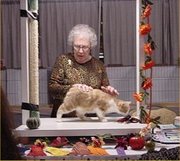

Custom Search
|
 A show cat (Manx) being judged at a show
A show cat (Manx) being judged at a show
A show cat (also known as a purebred cat or pedigreed cat) is one that has been judged to be close to the physical ideal for its breed standard at a cat show. Not all pedigreed cats are show cats, many are just pets but the ones with the best conformation and personality are often shown in associations such as the CFA and TICA in the US, the GCCF in the UK or the FiFe in the rest of Europe. Uncommonly, a prize-winning pedigreed show cat can be worth thousands of dollars but most are loved pets. In order to compare examples of breeds and improve stock, cat shows are held where judges evaluate the cats according to a breed standard. Pedigreed cats are often identified with microchip implants.
A common misconception is that all pedigreed cats are less healthy than random bred cats due to inbreeding. Not all pedigreed cats are excessively inbred, however; in the past, this was the case with some breeds, before the modern understanding of genetics was widely circulated. Currently, breeders take great care to select for the healthiest animals, which has greatly reduced the incidence of health issues. Many of the worst, like PKD in Persians and HCM in Maine Coons, have been nearly eliminated due to preventive screening, long term tracking and study by geneticists.
Breeds have different origins, some are manmade or the result of mutation, while others are found in nature. Some breeds of cat have been created by taking a single tom cat or queen with an unusual physical characteristic that breeds true. The entire Cornish Rex breed can be traced back to a single parent animal with an unusual genetic mutation producing a curly coat. Both the Burmese and Tonkinese breeds can be traced back to a single cat, Wong Mau, which was brought from Burma in the 1930s. Breeders continually strive to eliminate negative characteristics that various cat breeds exhibit as the breeds are developed. There is not really any such thing as a 'purebred' cat since all registered breeds began as random bred cats. In this case, 'pedigreed' is a more accurate term.
Cat breeders are continually competing to find the 'ideal' of the breed - the cats that come closest to fitting the breed standard. Because of this, the physical characteristics of a prize-winning show cat have gradually changed in some breeds. This genetic shifting is most obvious in the two oldest, most popular and most distinctive breeds of show cat - the Persian and the Siamese. However, some show cats are naturally occurring breeds that are perpetuated to keep the original look of a cat from a particular region. Examples are the Maine Coon and Turkish Van.
show cat, purebred cat, pedigreed cat, judged, physical ideal, breed standard, cat show, pedigreed, cats, pets, conformation, personality, associations, CFA, TICA, GCCF